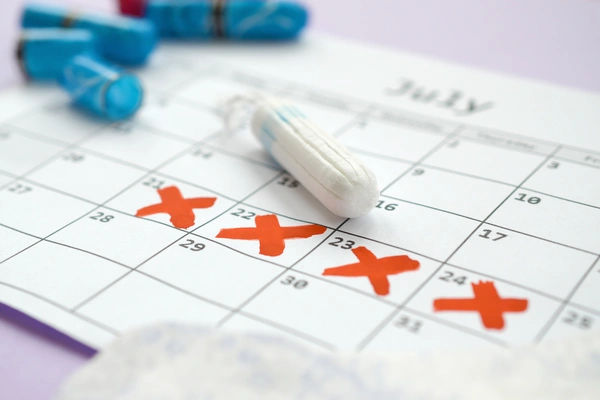Delayed Period: Causes, Diagnosis, and Treatment Options
Learn about the delayed period, what it is causes, diagnosis, treatment options and more.

Written by Dr. Dhankecha Mayank Dineshbhai
Reviewed by Dr. Vasanthasree Nair MBBS
Last updated on 13th Jan, 2026

Introduction
Your period is late, and a wave of anxiety washes over you. While pregnancy is often the first thought, it's far from the only reason for a delayed period. A menstrual cycle is a complex symphony of hormones, and even a slight disruption can throw the entire rhythm off. This guide will walk you through everything you need to know about missed or late periods, from common lifestyle factors to underlying medical conditions.
What Exactly is a Delayed Period?
A "normal" menstrual cycle can range from 21 to 35 days, with the average being around 28 days. The length can vary from person to person and even from cycle to cycle.
- A late period: Typically defined as a period that is 5 or more days past its expected start date.
- A missed period: Usually refers to the absence of bleeding for 6 weeks or more since your last menstrual period.
It's important to remember that occasional irregularities are common. However, consistently irregular cycles or a sudden, unexplained delay warrant closer attention.
Consult a Gynaecologist for Personalised Advice
Common Causes of a Delayed Period
The reasons behind a late menstrual cycle are diverse. They can be broadly categorised into lifestyle factors, hormonal conditions, and other medical issues.
Lifestyle and External Factors
Often, the simplest explanations are related to your daily habits and environment.
- High Stress Levels: Chronic stress elevates cortisol levels, which can suppress the hypothalamic-pituitary-ovarian (HPO) axis the command centre for your reproductive hormones. This disruption can halt ovulation and delay your period.
- Significant Weight Changes: Being significantly underweight can cause the body to conserve energy by shutting down non-essential functions like reproduction, leading to amenorrhea (the absence of periods). Rapid weight loss can have the same effect. Conversely, being overweight can lead to excess estrogen production, which can also disrupt the cycle.
- Excessive Exercise: Intense physical training, common among athletes, can burn more calories than are consumed and lower body fat, both of which can pause ovulation and menstruation. This is often called "exercise-induced amenorrhea."
- Diet and Nutrition: Poor nutrition or eating disorders like anorexia nervosa or bulimia can severely impact hormone production.
Hormonal and Medical Conditions
When lifestyle factors aren't the cause, an underlying health issue may be at play.
- Polycystic Ovary Syndrome (PCOS): This is one of the most common hormonal imbalance causes of irregular periods. PCOS is characterised by elevated levels of androgens (male hormones), which can prevent ovulation and cause missed periods.
- Thyroid Disorders: Both an overactive thyroid (hyperthyroidism) and an underactive thyroid (hypothyroidism) can interfere with the menstrual cycle. The thyroid gland helps regulate metabolism, which is tightly linked to reproductive function.
- Premature Ovarian Insufficiency (POI): Also known as primary ovarian insufficiency, this occurs when the ovaries stop functioning normally before age 40, leading to irregular or missed periods.
- Recent Pregnancy, Birth, or Breastfeeding: After pregnancy, it can take time for regular cycles to resume, especially if you are breastfeeding exclusively (lactational amenorrhea).
Other Potential Causes
- Perimenopause: The transition to menopause, which can begin up to 10 years before menopause itself, is marked by increasingly irregular periods as ovarian function declines.
- Certain Medications: Antidepressants, antipsychotics, chemotherapy, and some blood pressure medications can affect your cycle. Similarly, coming off hormonal birth control can cause a temporary delay as your body readjusts to its natural rhythm.
- Chronic Illnesses: Conditions like celiac disease or uncontrolled diabetes can also disrupt menstrual regularity.
How is the Cause of a Delayed Period Diagnosed?
Seeking a professional diagnosis for irregular periods is crucial for identifying the root cause. The process typically involves several steps.
Initial Consultation and Medical History
Your doctor will start by asking detailed questions about:
- Your menstrual history (age of first period, typical cycle length).
- Your current symptoms.
- Your lifestyle, diet, and exercise habits.
- Your stress levels.
- Any medications you are taking.
- Your sexual history.
Diagnostic Tests and Procedures
Based on the initial consultation, your doctor may order one or more of the following:
1. Pregnancy Test: This is almost always the first test to rule out pregnancy.
2. Blood Tests: These are essential for checking:
* Hormone levels: Including thyroid-stimulating hormone (TSH), prolactin, follicle-stimulating hormone (FSH), luteinizing hormone (LH), and testosterone.
* Blood glucose levels: To screen for diabetes.
3. Pelvic Ultrasound: This imaging test allows the doctor to visualise your uterus, ovaries, and pelvis. It can identify issues like PCOS (showing multiple small cysts on the ovaries), uterine fibroids, or other structural abnormalities.
4. Pap Smear or Pelvic Exam: To check for any abnormalities in your reproductive organs.
This diagnostic journey helps paint a complete picture, moving from the most common causes to more specific conditions to find the correct diagnosis for amenorrhea.
Treatment Options for Irregular Periods
The treatment for a missed period is not one-size-fits-all; it is entirely dependent on the underlying cause. The goal is to address the root issue and restore a healthy, regular cycle.
Lifestyle Modifications
For many, treatment begins with positive lifestyle changes:
- Stress Management: Incorporating techniques like yoga, meditation, mindfulness, or therapy can significantly lower cortisol levels and regulate cycles.
- Achieving a Healthy Weight: Working with a doctor or nutritionist to reach and maintain a healthy weight for your body can often restart normal ovulation.
- Moderating Exercise: If excessive exercise is the cause, reducing intensity and ensuring adequate caloric intake can help.
- Balanced Diet: Ensuring you get enough vitamins, minerals, and healthy fats is crucial for hormonal health.
Medical Treatments
When lifestyle changes aren't enough, medical intervention may be necessary.
- Hormonal Therapy: This is a common treatment for hormonal imbalance. Options include:
- Hormonal Birth Control: Pills, patches, or rings can help regulate the menstrual cycle by providing a steady dose of estrogen and/or progesterone.
- Progesterone Therapy: A short course of progesterone can be prescribed to trigger a period and reset the cycle.
Treating Underlying Conditions:
- PCOS: Management may involve birth control to regulate periods, metformin to control insulin resistance, or medications to induce ovulation if pregnancy is desired.
- Thyroid Disorders: Medication to normalise thyroid hormone levels will typically restore menstrual regularity.
- Fertility Treatments: If the goal is to conceive and irregular periods are linked to anovulation, medications like Clomiphene Citrate (Clomid) or Letrozole (Femara) may be used to stimulate ovulation.
When to See a Doctor?
It's important to consult a healthcare provider if:
- You've missed three or more periods in a row.
- Your periods suddenly become irregular after being regular.
- Your cycle is less than 21 days or more than 35 days.
- You experience severe pain, unusually heavy bleeding, or other concerning symptoms along with the delay.
- You suspect you might be pregnant.
Conclusion
A delayed period can be a source of significant worry, but it's often a signal from your body that something is off-balance. While occasional irregularities are normal, persistent issues should not be ignored. From lifestyle factors like stress and diet to medical conditions like PCOS or thyroid disorders, the causes are varied. Obtaining a proper diagnosis is the critical first step toward finding the right treatment plan for you, which could be as simple as adopting stress-reduction techniques or may involve hormonal therapy. B. Listen to your body it's often trying to tell you something important.
Consult a Gynaecologist for Personalised Advice
Consult a Gynaecologist for Personalised Advice

Dr. Abhishek Daga
Obstetrician and Gynaecologist
20 Years • MBBS, MS (Obstetrics & Gynaecology)
Kolkata
Gynae Care Fertility Centre, Kolkata
(150+ Patients)

Dr. Ashish Kale
Obstetrician and Gynaecologist
19 Years • MBBS, MD (OBG), DNB, MNAMS, Diploma in Endopelvic Surgery, Fellowship in Embryology, Fellowship in ART.
Pune
Apollo Hospitals Pune, Pune

Dr M Dharini
Obstetrician and Gynaecologist
9 Years • MBBS,DGO,MS OG,DNB OG
Chennai
Apollo Hospitals Tondiarpet, Chennai

Dr. P Sandhya Pithani
Obstetrician and Gynaecologist
2 Years • MBBS, DNB(OBGY)
Kakinada
Apollo Hospitals Surya Rao Peta, Kakinada
(50+ Patients)

Dr Shravya Manohar
Obstetrician and Gynaecologist
9 Years • MB,MS OBGYN ,MRCOG (Lon),FMAS
Chennai
Apollo Women Hospitals Thousand Lights, Chennai
(25+ Patients)
Consult a Gynaecologist for Personalised Advice

Dr. Abhishek Daga
Obstetrician and Gynaecologist
20 Years • MBBS, MS (Obstetrics & Gynaecology)
Kolkata
Gynae Care Fertility Centre, Kolkata
(150+ Patients)

Dr. Ashish Kale
Obstetrician and Gynaecologist
19 Years • MBBS, MD (OBG), DNB, MNAMS, Diploma in Endopelvic Surgery, Fellowship in Embryology, Fellowship in ART.
Pune
Apollo Hospitals Pune, Pune

Dr M Dharini
Obstetrician and Gynaecologist
9 Years • MBBS,DGO,MS OG,DNB OG
Chennai
Apollo Hospitals Tondiarpet, Chennai

Dr. P Sandhya Pithani
Obstetrician and Gynaecologist
2 Years • MBBS, DNB(OBGY)
Kakinada
Apollo Hospitals Surya Rao Peta, Kakinada
(50+ Patients)

Dr Shravya Manohar
Obstetrician and Gynaecologist
9 Years • MB,MS OBGYN ,MRCOG (Lon),FMAS
Chennai
Apollo Women Hospitals Thousand Lights, Chennai
(25+ Patients)


